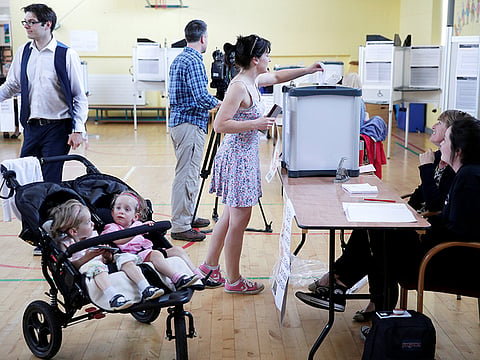Irish vote in abortion referendum
A simple majority will decide the future course of the nation on the emotive issue

CORK, IRELAND: Since 7am Friday morning, polls opened across Ireland in a referendum that will determine whether a strict constitutional ban on abortion will be overturned and replaced by access to termination of pregnancies in the first 12 weeks of gestation.
For a nation that was one deeply Roman Catholic, abortion is a highly charged and emotive issue, and 35 years ago Irish voters then chose to impose a strict ban on the procedure, giving the unborn child the same equal rights as a mother.
But Ireland has changed, with a series of scandals over the past two decades rocking traditional faith in the institutions of the church and its role in managing care homes for unmarried mothers, and through a series of sexual abuse crimes committed against children in its care.
Indeed, the last time the 3 million Irish voters over the age of 18 were consulted in a referendum, Ireland became the first nation in the world to ratify gay marriage in a popular vote.
Opinion polls leading up to Friday’s poll showed the Yes side with a lead of between 12 and 15 percentage points, but one voter in five had yet to make up their minds. But with the polls open until 10pm local time — 7pm UAE time — turnout is expected to be reasonable high, likely passing the 70 per cent if early voting trends continued.
The result should be clear by lunchtime Saturday Irish time.
At one polling station in the commuter town of Newbridge, some 40 kilometres south east of Dublin, 14 per cent of voters registered there had cast ballots by 11am — before the lunchtime and post-work evening rushes when voting levels increase significantly.
Voters are being asked a simple question on whether to overturn the Eighth Amendment to Ireland’s Constitution — a clause that prohibits abortion in all but the strictest of circumstances. A simple majority for Yes would allow the fragile coalition government of Taoiseach — Prime Minister — Leo Varadkar to introduce legislation allowing for abortion in the first 12 weeks of pregnancy.
A simple majority for ‘No’ would mean the constitutional ban, introduced by a previous referendum in 1983, would stay in place. Since then, it’s estimated that more than 180,000 Irish women have travelled to Britain for the procedure, and average of nine women every day.
Archbishop Eamon Martin also warned that repealing the Eighth Amendment would pave the way for a very liberal abortion regime, with unrestricted access to the procedure during the first trimester of pregnancy.
The leader of the Roman Catholic Church, in a pastoral letter read out to those who did attend services, said that to be against abortion is not simply “a Catholic thing”.
“When you go inside the polling booth,” the Archbishop reminded voters, “pause and think of two lives — the life of the mother and the life of her baby, two hearts beating, two lives which are both precious and deserving of compassion and protection.”
In a video released by Together For Yes, the father of Savita Halappanavar, Andanappa Yalagi said he strongly feels “that the younger daughters of Ireland should not have the fate of Savita”.
The Indian dentist was 31 when she was admitted to hospital in Galway in October 2012 in severe pain and bleeding 17 weeks into a pregnancy. She died a week later from septic shock and massive organ failure after doctors refused to terminate her troubled pregnancy as they detected a fetal heartbeat.



